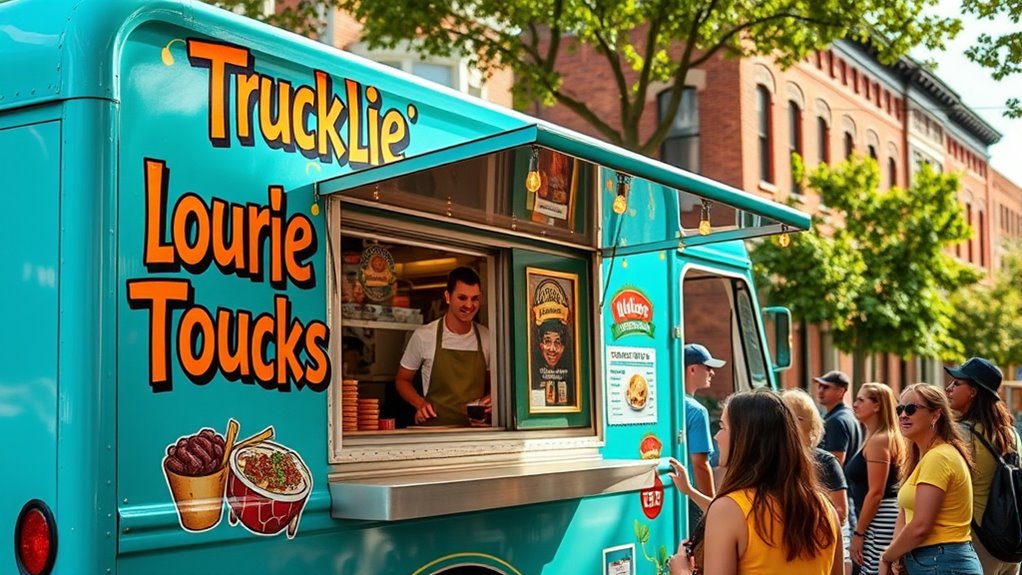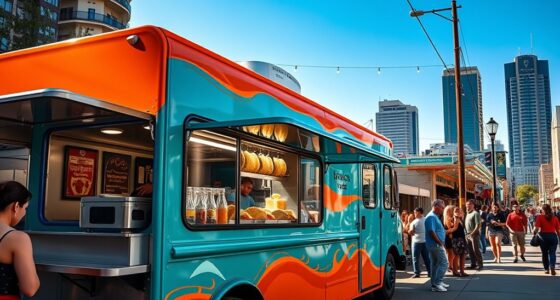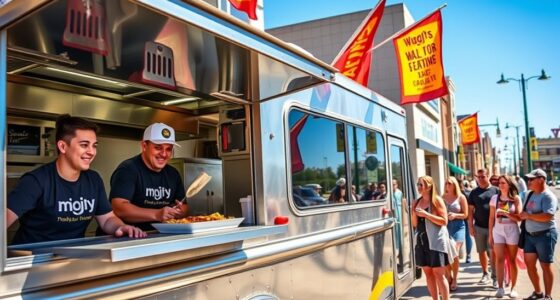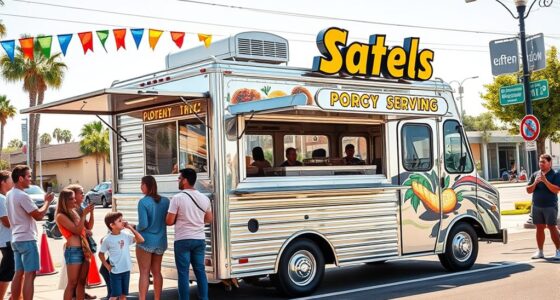To start a food truck in Montgomery, AL, you should focus on building relationships with local farmers to access fresh ingredients and develop seasonal menus that highlight regional flavors. You’ll need to follow local health regulations, secure permits, and choose the right equipment to guarantee smooth operations. Budget wisely and consider securing small business grants. For more tips on launching your food truck, explore how to connect with the community and grow your brand locally.
Key Takeaways
- Obtain necessary permits and licenses by applying online through Montgomery’s health and city departments.
- Build relationships with local farms for fresh, seasonal ingredients to support local producers and enhance menu appeal.
- Secure appropriate insurance coverage, including liability insurance, to meet legal requirements and protect your investment.
- Develop a detailed budget covering vehicle costs, customization, maintenance, and potential funding options like small business grants.
- Engage with the local community by participating in events and forming partnerships to increase visibility and customer loyalty.
Fresh Local Food Scene
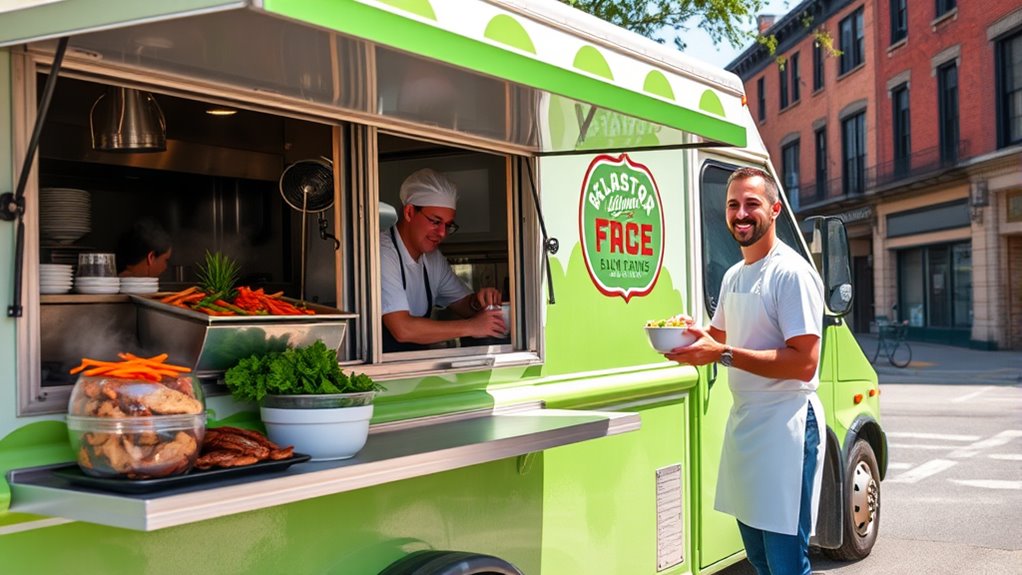
Have you noticed how Montgomery’s food truck scene celebrates fresh, local ingredients? You can tap into this vibrant movement by building strong relationships with local farm partnerships. These connections guarantee you access the freshest produce, dairy, and meats, elevating your menu’s quality. Seasonal menu planning is vital; it allows you to adapt your offerings based on what’s in harvest, keeping your dishes innovative and appealing. By emphasizing locally sourced ingredients, you not only support area farmers but also create a unique identity for your food truck. Customers appreciate transparency and authenticity, making local collaborations a smart way to stand out. Focusing on fresh, seasonal ingredients will help you deliver delicious meals that resonate with Montgomery’s community vibe. Additionally, participating in internal company hackathons can inspire creative ideas for menu development and operational improvements that enhance your food truck’s success.
Understanding Local Requirements
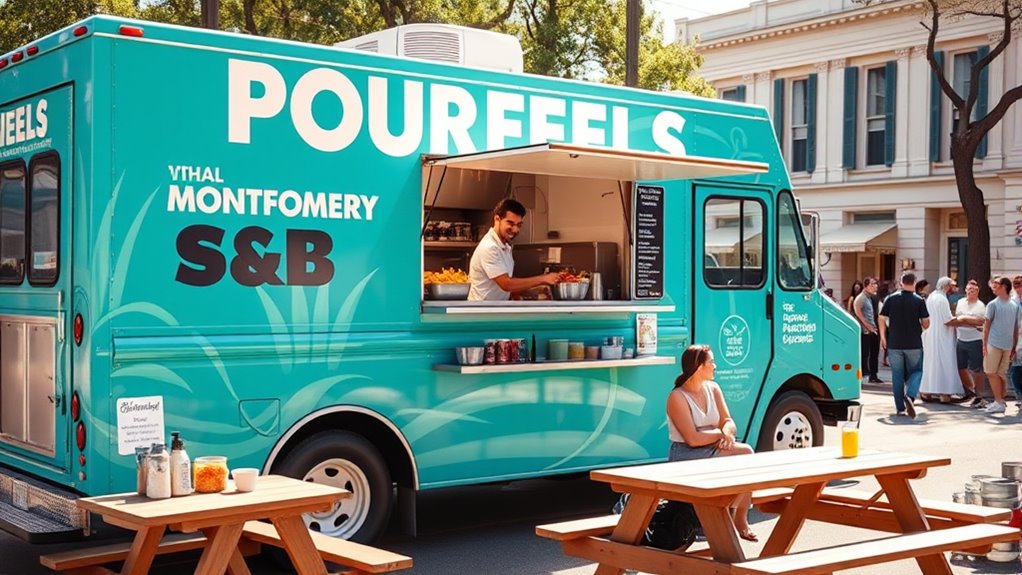
To operate a food truck in Montgomery, AL, you’ll need to understand the local requirements, starting with the online permit application process. You also must follow sanitation procedures and keep proper records to stay compliant. Additionally, familiarize yourself with designated food truck zones to make certain you’re parking in authorized areas. It is important to regularly check local health regulations to ensure ongoing compliance and safety standards.
Online Permit Application Process
Guiding the online permit application process for a food truck in Montgomery, AL, requires understanding the city’s specific requirements and procedures. First, visit the Montgomery city website to access the online application portal. You’ll need to gather necessary documents, such as your business license, proof of insurance, and vehicle registration. The permit process is streamlined through this digital system, allowing you to submit your application quickly and conveniently. Make sure to review all instructions carefully before submitting, as incomplete applications can delay approval. After submitting your online application, you may need to pay a fee and wait for approval from the local health department and city officials. Staying organized and following the online steps precisely helps guarantee a smooth permit process for your food truck.
Sanitation Procedures and Recordkeeping
Once your online permit application is submitted and approved, maintaining proper sanitation procedures becomes a top priority. You must follow local requirements for handwashing protocols and sanitation station setup to guarantee food safety. Keep detailed records of cleaning schedules, temperatures, and sanitation practices to stay compliant. Regularly train staff on proper handwashing techniques and sanitation procedures. Your sanitation station should include:
- Handwashing sinks with hot water and soap
- Sanitizer dispensers
- Cleaning supplies
- Proper waste disposal containers
Consistent recordkeeping helps you demonstrate compliance during inspections. Remember, proper sanitation isn’t just about compliance; it’s essential for customer safety and your reputation. Stay vigilant and keep thorough records to avoid penalties and ensure smooth operations.
Designated Food Truck Zones
Understanding local requirements for designated food truck zones is essential for ensuring smooth operation and legal compliance. In Montgomery, AL, specific zones may be designated for food trucks, often near popular spots like craft beer venues or vibrant street art locations. You need to check city ordinances to know where you’re allowed to park and sell. Some zones might require permits or special permissions, especially if you’re near areas with high foot traffic or cultural significance. Being aware of these zones helps you avoid fines and ensures your truck is accessible to customers who want to enjoy local craft beer or explore street art scenes. Always stay updated on local regulations to keep your food truck business running smoothly and legally.
Setting Up Your Base of Operations

When setting up your base of operations, you’ll need to understand shared kitchen licensing requirements in Montgomery to stay compliant. Choosing the right custom kitchen appliances can make your workflow more efficient and meet health standards. Make sure to research local regulations and select equipment that suits your menu and space. For example, investing in durable and reliable appliances, such as flat iron bikes, can enhance your mobility and efficiency when transporting ingredients and supplies.
Shared Kitchen Licensing Requirements
Setting up your food truck’s base of operations in Montgomery requires obtaining the proper shared kitchen license. This license guarantees you meet all necessary shared kitchen licensing and food prep regulations. To qualify, you’ll need to:
- Provide proof of kitchen cleanliness and safety standards
- Submit detailed plans of your food prep process
- Demonstrate compliance with local health department inspections
- Complete any required food safety training courses
These steps help confirm your shared kitchen meets Montgomery’s standards for sanitation and safety. Remember, adhering to food prep regulations isn’t just legal; it’s essential for maintaining customer trust. By securing the proper licensing, you ensure your food truck operates smoothly and safely from your shared kitchen base.
Custom Kitchen Appliances Selection
Choosing the right custom kitchen appliances is essential for optimizing your food truck’s workflow and ensuring consistent quality. When selecting custom kitchen appliances, focus on durability, size, and energy efficiency to fit your specific menu needs. These appliances should streamline food prep and cooking, so consider options like compact ovens, fryers, and refrigeration units. Utilizing menu design tools can help you plan appliance placement for maximum efficiency and safety. Properly chosen equipment reduces prep time, minimizes downtime, and maintains food quality. Invest in high-quality, tailored appliances that suit your menu, saving you money and hassle in the long run. Remember, well-chosen appliances are the backbone of a smooth-running food truck operation in Montgomery.
Budgeting and Financing Your Food Truck
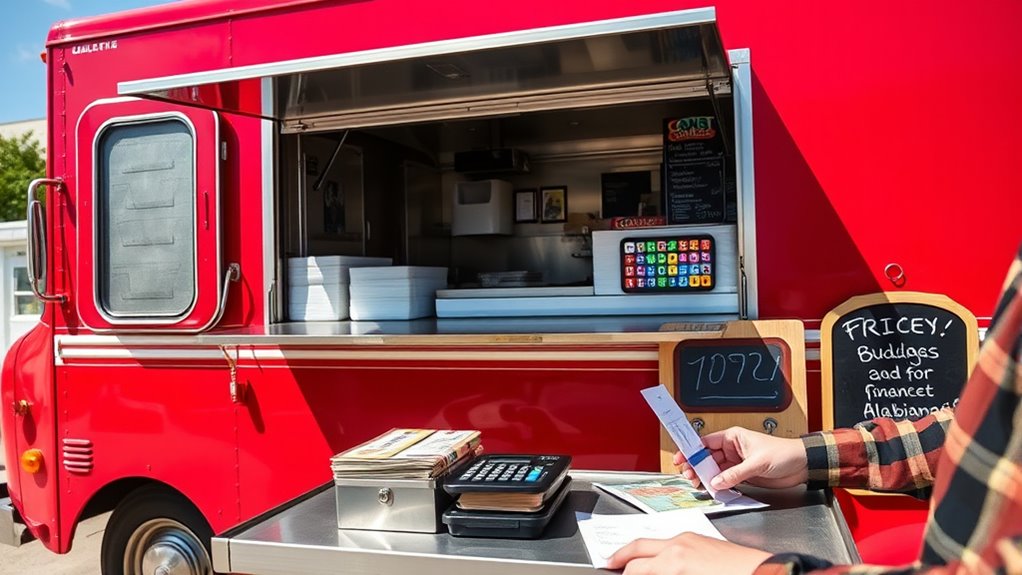
To get started, you need to budget for your vehicle purchase and consider options like local small business grants to help with costs. It’s also essential to factor in liability coverage to protect your business and assets. Understanding these expenses early on will set a solid foundation for your food truck venture. Developing a clear financial plan can help you manage cash flow effectively and ensure long-term sustainability.
Initial Vehicle Purchase Costs
Purchasing your food truck is a significant financial step, and understanding the initial vehicle costs is essential for effective budgeting. The upfront expense varies based on whether you buy new or used, with prices typically ranging from $20,000 to $100,000. Keep in mind that your budget should also cover vehicle maintenance and insurance requirements, which are ongoing costs. When selecting a truck, consider these factors:
- Vehicle age and condition
- Customization and equipment needed
- Fuel efficiency
- Resale value
A reliable vehicle minimizes future repair costs and helps maintain consistent operations. Additionally, proper insurance helps protect your investment and meets local legal requirements. Being thorough in evaluating initial costs ensures you’re financially prepared for your food truck venture.
Local Small Business Grants
Securing local small business grants can provide essential funding to help cover the costs of starting your food truck in Montgomery, AL. These grants often support initiatives that boost local art and community events, making them ideal for food truck entrepreneurs looking to engage with the community. By applying for grants focused on small businesses, you can access funds that reduce your financial burden and foster connections with local artists and event organizers. Participating in community events not only promotes your food truck but also aligns with grant goals of strengthening local culture. Keep an eye out for grants from city programs, local art councils, or regional development agencies. Securing this funding can give your food truck a stronger start and a greater presence in Montgomery’s vibrant community scene.
Liability Coverage for Food Trucks
Understanding liability coverage is vital when budgeting and financing your food truck, as it protects your business from potential legal claims and financial losses. Insurance requirements for food trucks typically include liability coverage, which covers damages or injuries caused by your operation. Without adequate liability coverage, you risk significant out-of-pocket expenses if an accident occurs. To guarantee you’re prepared, consider these points:
- Liability coverage is often a legal requirement for food truck permits
- It helps protect your assets in case of lawsuits
- Choosing appropriate coverage limits is essential
- Regularly review your policy to stay compliant
Designing Your Menu and Pricing Strategy
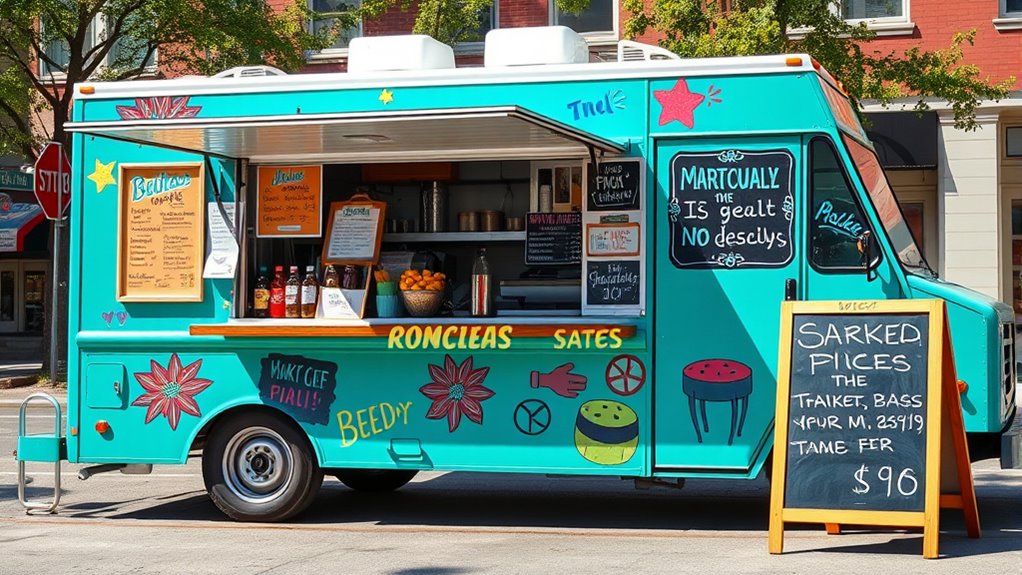
When designing your menu, consider using seasonal ingredients to keep costs down and flavors fresh. Setting affordable prices helps attract customers while ensuring your business stays profitable. Balancing quality and value is key to creating a menu that appeals to your community. Additionally, implementing secure payment systems can help safeguard customer transactions and build trust.
Seasonal Ingredient Sourcing
Incorporating seasonal ingredients into your menu not only keeps your offerings fresh and appealing but also allows you to optimize your pricing strategy. Seasonal menu planning helps you source ingredients when they’re at their peak, reducing costs and ensuring quality. To succeed with ingredient procurement strategies, consider these tips:
- Build relationships with local farmers and vendors
- Prioritize in-season produce for better freshness and pricing
- Adjust your menu based on ingredient availability
- Plan your inventory to minimize waste and spoilage
Affordable Pricing Strategies for Profitability
Designing an effective menu and pricing strategy is essential for turning your food truck into a profitable venture. Focus on pricing optimization by carefully calculating costs and setting prices that cover expenses while remaining competitive. To maximize profit margins, consider offering a range of items that balance high-demand dishes with higher-margin options. Keep your menu simple to control ingredient costs and streamline preparation. Test different price points to find what customers are willing to pay without sacrificing quality or volume. Regularly review sales data to adjust prices as needed. By strategically designing your menu and pricing, you’ll attract customers and ensure your food truck remains financially sustainable. This balanced approach helps you stay competitive while increasing your overall profitability.
Technology and Operations
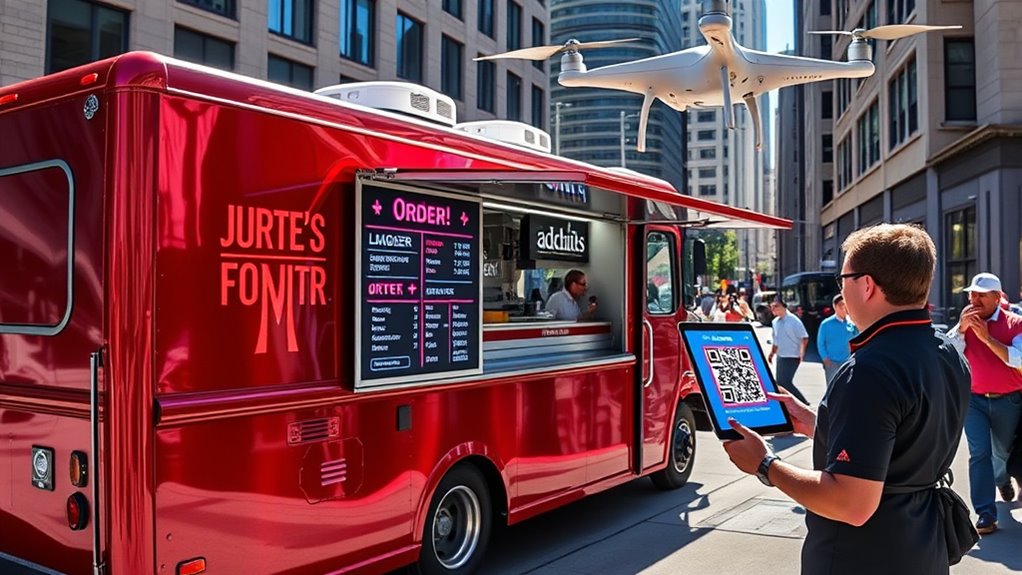
Using wireless card readers and apps lets you process payments quickly and securely, keeping your lines moving smoothly. Mobile POS systems and inventory apps help you track sales and stock in real time, so you stay organized on busy days. Embracing these technologies can streamline your operations and give you more time to focus on your customers.
Wireless Card Readers and Apps
Wireless card readers and apps have become essential tools for food truck operators looking to streamline transactions and improve customer service. They enable quick, secure cashless payments, reducing wait times and increasing efficiency. With mobile payment apps, you can accept a variety of payment methods, making transactions seamless for customers. These tools support:
- Contactless payments via NFC technology
- Compatibility with popular mobile payment apps
- Real-time transaction tracking
- Simplified setup and portability
Using wireless card readers, you eliminate the need for bulky equipment or cash handling, which minimizes errors and theft risks. Plus, they provide detailed sales data to help you manage inventory and optimize operations. Embracing this technology guarantees you stay competitive and meet customer expectations for quick, convenient payments.
Mobile POS and Inventory Apps
Building on the convenience of wireless card readers, mobile POS and inventory apps take your food truck’s operations to the next level by streamlining order management and stock control. With mobile payments integrated into your POS system, transactions become faster and more secure, reducing wait times and improving customer satisfaction. Inventory management features help you track ingredients and supplies in real-time, preventing shortages and overstocking. These apps allow you to easily update menu items, monitor sales trends, and generate reports on daily performance. Using a mobile POS simplifies your workflow, making it easy to process orders on the go. Overall, these tools boost efficiency, keep your inventory organized, and enhance the customer experience, helping your food truck run smoothly and profitably.
Marketing and Growing Your Presence
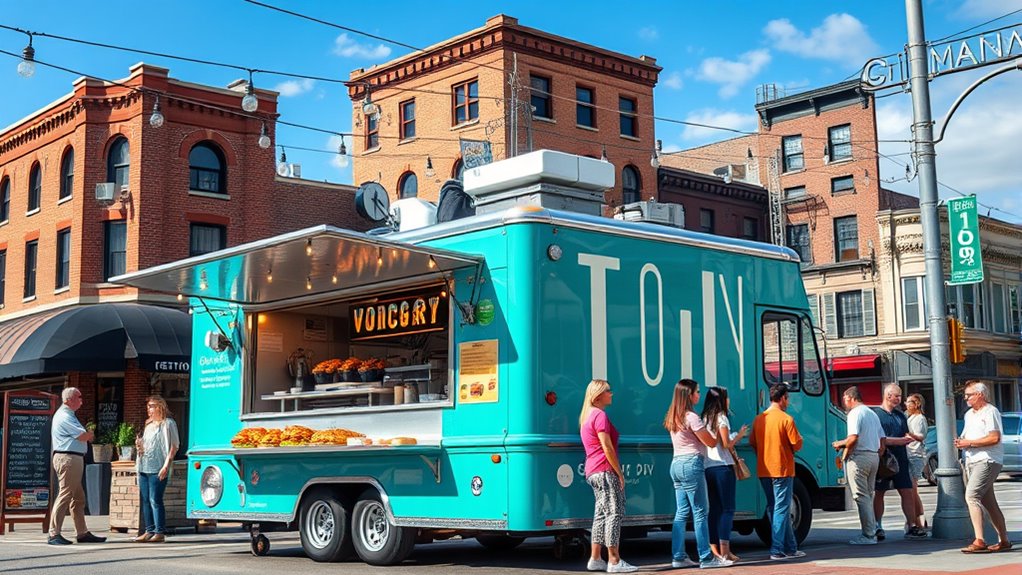
To boost your visibility, make sure to participate in popular local events and share your schedule with the community. Engaging local food bloggers can also help spread the word and attract new customers. Consistently promoting these opportunities keeps your food truck top of mind in Montgomery.
Popular Local Event Schedules
Participating in popular local events is one of the most effective ways to boost your food truck’s visibility in Montgomery, AL. These events attract diverse crowds, giving you the chance to showcase your food truck branding and build a loyal customer base. To maximize your presence, plan ahead by aligning your schedule with local fairs, farmers’ markets, and community festivals. Use eco friendly packaging to appeal to environmentally conscious consumers and reinforce your brand’s values. Keep in mind:
- Consistently attending key events builds recognition
- Engaging visuals attract attention
- Offering samples encourages trial
- Promoting your schedule on social media increases reach
Engaging Local Food Bloggers
Engaging local food bloggers can substantially boost your food truck’s visibility and credibility in Montgomery, AL. Connecting with local food bloggers allows you to reach a targeted audience already interested in food experiences. Engage influencers by inviting them to try your menu or host exclusive tasting events. They’ll share their honest reviews and mouthwatering photos, helping spread the word organically. To maximize this strategy, follow local food bloggers on social media, comment on their posts, and build genuine relationships. Offering them free meals or special promotions encourages authentic coverage. Remember, engaging influencers isn’t just about exposure; it’s about creating authentic partnerships that highlight what makes your food truck unique, ultimately attracting more customers and establishing a strong presence in Montgomery’s vibrant food scene.
Local Networking Opportunities
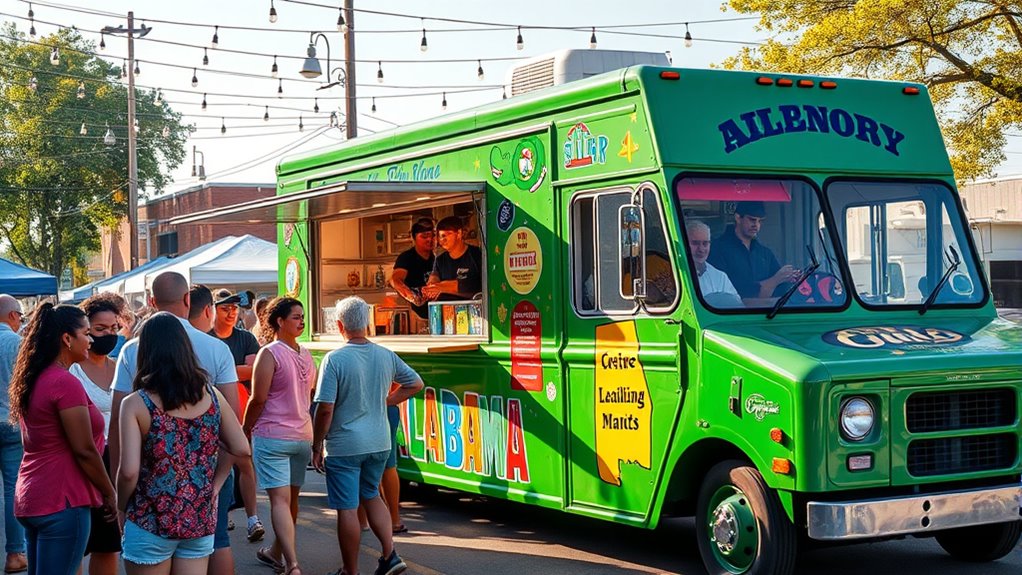
Montgomery offers a variety of networking events that can help food truck owners connect with local vendors, potential customers, and other entrepreneurs. These opportunities are key to building strong community collaborations and establishing local vendor partnerships. Attending events like farmers’ markets, business expos, and food festivals allows you to showcase your truck and form valuable relationships.
To maximize your networking efforts, consider:
- Joining local business associations
- Participating in community events
- Attending industry-specific meetups
- Collaborating with other food vendors
These activities help you gain visibility, gather feedback, and create a loyal customer base. Building lasting relationships through active engagement opens doors for future growth and success in Montgomery’s vibrant food scene.
Frequently Asked Questions
What Are the Best Locations to Park a Food Truck in Montgomery?
You should park your food truck in high traffic areas like downtown Montgomery, near popular events, or busy commercial districts. Always check parking regulations to avoid fines or towing, especially in metered or restricted zones. Locations like the Civic Center, parks, or near college campuses attract lots of foot traffic. By choosing spots with high visibility and ensuring compliance with regulations, you’ll maximize your sales and build a loyal customer base.
How Do Montgomery’s Weather Conditions Affect Food Truck Operations?
Montgomery’s weather conditions can impact your food truck operations considerably. Hot, humid summers require a seasonal menu with invigorating options, while winter cold and rain may limit outdoor service. Always prioritize weather safety by securing equipment during storms and adjusting your hours accordingly. Being flexible with your menu and prepared for weather changes helps you stay efficient and safe, ensuring customers enjoy your food regardless of the season.
Are There Specific Montgomery Events Ideal for Food Truck Participation?
Yes, Montgomery hosts local event festivals and community gatherings that are perfect for food truck participation. You should target events like the Montgomery Riverfront Festival or the Mayfest, which attract large crowds and offer great exposure. By aligning your truck with these happenings, you can boost sales and build a loyal customer base. Make sure to check event schedules and arrive early to secure a prime spot.
What Permits Are Needed for Nighttime Food Truck Operations?
Starting nighttime operations in Montgomery’s food truck scene is a game-changer! You’ll need to obtain the appropriate food truck permits and adhere to nighttime operations regulations. These permits ensure your truck meets health and safety standards, while regulations cover curfews, noise levels, and parking rules. Make sure to check with Montgomery’s city licensing office to get all required paperwork, so your nighttime culinary adventure runs smoothly and legally.
How Can I Partner With Local Montgomery Farmers for Fresh Ingredients?
You can partner with local Montgomery farmers for fresh ingredient sourcing by attending farmers’ markets and community events to connect directly. Reach out to farm owners to discuss collaborations, offering to buy ingredients regularly for your food truck. Building relationships through local farmer collaborations helps guarantee fresh, quality ingredients while supporting the community. Be transparent about your needs, and consider signing agreements to make the partnership mutually beneficial.
Conclusion
Starting a food truck in Montgomery might seem like a spicy adventure, but remember, even the best tacos need the right seasoning—like patience and a dash of persistence. So go ahead, chase those dreams, serve up some local flavor, and maybe even outshine the barbecue. Just don’t forget, in this city of sweet tea and southern charm, a little humor and a lot of hustle are the secret ingredients to your success. Good luck, chef!
